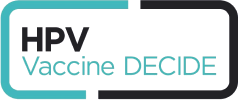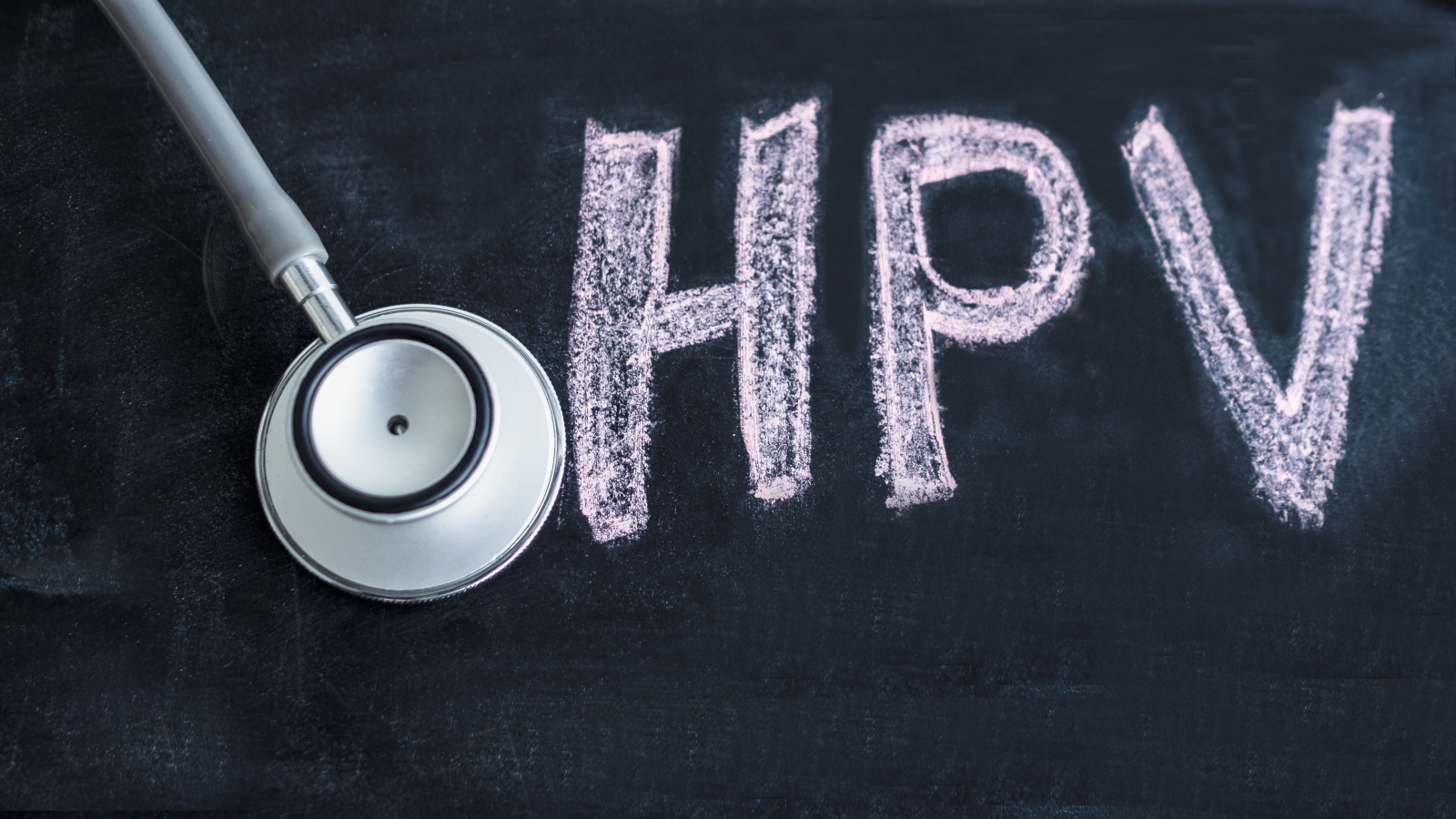The following pages include information to help someone ages 27-45 in the United States decide if the HPV vaccine is right for them.
© 2024 The University of North Texas Health Science Center at Fort Worth. © 2025 The University of Texas Health Science Center at San Antonio. All rights reserved.


Welcome to the Adult Human Papillomavirus (HPV) Vaccination Decision Aid Tool.
HPV is a virus that causes multiple cancers (cervical, vaginal, vulvar, anal, penile, mouth/throat) and anal/genital warts. But there is an HPV vaccine to prevent these diseases. This tool is designed specifically for adults who are unvaccinated, and it will provide you with information to make an informed decision about HPV vaccination.
Should I get the HPV (Human papillomavirus) vaccine?
If you are an adult 45 or younger and have not already been vaccinated, you can now decide if the HPV vaccine is right for you.
In 2019, the Centers for Disease Control and Prevention (CDC) recommended that adults up to age 45 who were not already vaccinated might choose to get HPV vaccine after speaking with a healthcare provider about the possible benefits of vaccination.
Who is this decision support tool for?
This decision support tool was designed specifically for adults between the ages of 27 and 45 who are unvaccinated. It will help you make an informed decision about HPV vaccination.
What will I get out of this decision support tool?
In less than 5 minutes, we will provide you with facts about HPV infection including risk factors and HPV-related cancers. We will also help you compare your options and decide what is most important to you.
Meites E. Human Papillomavirus Vaccination for Adults: Updated Recommendations of the Advisory Committee on Immunization Practices. Morbidity and Mortality Weekly Report. 2019;68(32):698-702. doi: http://dx.doi.org/10.15585/mmwr.mm6832a3

What is HPV vaccination?

Want more information? Click on the questions below to find out more about HPV.
- Women and people with a cervix can be tested for current HPV infection with an HPV test during routine cervical cancer screening. These tests will not tell you if you had a previous HPV infection.
- Currently, men are not routinely tested for HPV infection.
- If a person thinks they have genital or anal warts, a healthcare provider can diagnose and treat it.
What does HPV vaccination do?
HPV vaccination prevents HPV infections that cause six types of cancer, including cervical, anal, vaginal, vulvar, penile, and mouth/throat cancer, and anal/genital warts.
The HPV vaccine is approved for use in males and females between the ages of 9 and 45.
The Centers for Disease Control & Prevention recommends 27- to 45-year-olds talk to their healthcare provider about HPV vaccination to decide whether they might benefit from vaccination.
Meites E, et al., (2019). Human papillomavirus vaccination for adults: Updated recommendations of the advisory committee on immunization practices. Morbidity and Mortality Weekly Report. 2019;68(32):698-702. doi: http://dx.doi.org/10.15585/mmwr.mm6832a3
Markowitz, L. E. et al, (2014) Human papillomavirus vaccination: recommendations of the advisory committee on immunization practices (ACIP). Morbidity and Mortality Weekly Report: Recommendations and Reports, 2014; 63(5), 1-30. https://www.cdc.gov/mmwr/preview/mmwrhtml/rr6305a1.htm
Food and Drug Administration (2018). Prescribing information [package insert]. Gardasil 9 (human papillomavirus 9-valent vaccine, recombinant). Silver Spring, MD: US Department of Health and Human Services, Food and Drug Administration; 2018. https://www.fda.gov/files/vaccines,%20blood%20&%20biologics/published/Package-Insert---Gardasil.pdf
US Preventive Services Taskforce (2018). Final recommendation statement: Cervical cancer screening; 2018. https://www.uspreventiveservicestaskforce.org/uspstf/recommendation/cervical-cancer-screening
Centers for Disease Control and Prevention (2023). Division of STD prevention, National center for HIV, viral hepatitis, STD, and TB prevention https://www.cdc.gov/std/treatment-guidelines/hpv-cancer.htm
Winer, R. L et al., (2006). Condom Use and the risk of genital human papillomavirus infection in young women. New England Journal of Medicine, 354(25), 2645–2654. "https://doi.org/10.1056/NEJMoa053284 Centers for Disease Control and Prevention (2022). Division of STD prevention, National center for HIV, viral hepatitis, STD, and TB prevention https://www.cdc.gov/std/hpv/stdfact-hpv.htm
Compare your options

If you decide to get vaccinated:
- HPV vaccination includes a series of 3 shots over a 6-month period. A person would get the second shot 1-2 months after the first and get the third shot 6 months after the first.
- You may reduce your risk of pre-cancer, some cancers (cervical, vaginal, vulvar, anal, penile, mouth/throat), genital warts, and anal warts.
- Side effects are usually mild and may include temporary soreness where the shot is given, low fever, and headache.
If you decide not to get vaccinated:
- You should talk to your doctor about other ways to reduce your risk of HPV infection such as
avoiding intimate sexual contact (e.g. oral, vaginal, and anal sex).
- Using condoms may help reduce risk of transmission.
- Without the HPV vaccine, you may be more likely to get HPV infection and develop anal/genital warts and cancer.
Meites E, et al. Human Papillomavirus Vaccination for Adults: Updated Recommendations of the Advisory Committee on Immunization Practices. Morbidity and Mortality Weekly Report. 2019;68(32):698-702. doi: http://dx.doi.org/10.15585/mmwr.mm6832a3
Markowitz, L. E. et al. Human papillomavirus vaccination: recommendations of the Advisory Committee on Immunization Practices (ACIP). Morbidity and Mortality Weekly Report: Recommendations and Reports, 2014; 63(5), 1-30. https://www.cdc.gov/mmwr/preview/mmwrhtml/rr6305a1.htm
Food and Drug Administration. Prescribing information [package insert]. Gardasil 9 (human papillomavirus 9-valent vaccine, recombinant). Silver Spring, MD: US Department of Health and Human Services, Food and Drug Administration; 2018. https://www.fda.gov/files/vaccines,%20blood%20&%20biologics/published/Package-Insert---Gardasil.pdf
US Preventive Services Taskforce. Final recommendation statement: Cervical cancer screening; 2018. https://www.uspreventiveservicestaskforce.org/uspstf/recommendation/cervical-cancer-screening
Division of STD Prevention, National Center for HIV, Viral Hepatitis, STD, and TB Prevention, Centers for Disease Control and Prevention. https://www.cdc.gov/std/treatment-guidelines/hpv-cancer.htm

This tool was designed to help you determine what matters most to you about HPV vaccination.
What matters most to you when deciding to get or not get the HPV vaccine? Select below.
Does not matter to me
Matters somewhat to me
Matters a lot to me
Preventing HPV-related cancer.
Preventing genital or anal warts.
Knowing how HPV vaccination affects my partner.
Potential side effects of the HPV vaccine.
Potential costs to get vaccinated.
My risk for getting an HPV infection

We want to give you some information based on what you told us matters the most to you about HPV vaccination.
You said that these topics mattered the most to you.

HPV vaccination can prevent about 33,700 cancers every year--that's the same as the average attendance at a major league baseball game.
HPV vaccination is proven to prevent cervical, vulvar, vaginal, anal, mouth/throat, and penile cancers. HPV vaccination is most effective if it is given before the onset of sexual activity. That is why it is important to vaccinate adolescents. But sexually active adults can still benefit.
In a study of women aged 27 to 45, the effectiveness of HPV vaccination in preventing persistent HPV infection ranged from 79% to 95%. It is expected that the vaccine will be as effective in men based on available data of immunity.
HPV infection is the primary cause of warts on the vulva, vagina, cervix, penis, scrotum, and anus.
About 1 in 100 sexually active adults will have genital warts at any given time.
HPV is easily transmitted. It is estimated that HPV is transmitted in 2 of every 5 male-female sexual encounters.
HPV is spread by sexual contact whether or not there is penetration. It can be transmitted through oral, vagina, and anal sex. It can also be spread through other types of sexual activity (e.g., mutual masturbation).
By protecting yourself and getting vaccinated, you are protecting your sexual partner(s).
With over 15 years of monitoring and 500 million doses administered worldwide, the HPV vaccine is proven to be safe.
The HPV vaccine, like any medicine, can have side effects. The most common side effects are pain or swelling at the injection site, redness, and headache. These usually resolve within 48 hours.
HPV vaccine does not cause fertility problems in men or women.
People should not get the HPV vaccine while pregnant.
Learn more about HPV vaccine safety: https://www.cdc.gov/vaccinesafety/vaccines/hpv/hpv-safety-faqs.html
The HPV vaccine is covered by most insurance types up to the age of 45.
Without insurance the vaccine is roughly $250 per dose.
For people who can't afford to pay for vaccination, there are some patient assistance programs available. https://www.gardasil9.com/adults/cost/

Four out of five sexually active people will get HPV during their lifetime.
The more sexual partners you have the greater your risk for HPV.
While these topics were not rated as most important to you on the last page, here is the information if you would like to explore it further. Please click to expand section(s).

HPV vaccination can prevent about 33,700 cancers every year--that's the same as the average attendance at a major league baseball game.
HPV vaccination is proven to prevent cervical, vulvar, vaginal, anal, mouth/throat, and penile cancers. HPV vaccination is most effective if it is given before the onset of sexual activity. That is why it is important to vaccinate adolescents. But sexually active adults can still benefit.
In a study of women aged 27 to 45, HPV vaccination prevented persistent HPV infection in 79% to 95% of women. It is expected that the vaccine will work as well in men based on available data on immunity.
HPV infection is the primary cause of warts on the vulva, vagina, cervix, penis, scrotum, and anus.
About 1 in 100 sexually active adults will have genital warts at any given time.
HPV is easily transmitted. It is estimated that HPV is transmitted in 2 of every 5 male-female sexual encounters.
HPV is spread by sexual contact whether or not there is penetration. It can be transmitted through oral, vagina, and anal sex. It can also be spread through other types of sexual activity (e.g., mutual masturbation).
By protecting yourself and getting vaccinated, you are protecting your sexual partner(s).
With over 15 years of monitoring and 500 million doses administered worldwide, the HPV vaccine is proven to be safe.
The HPV vaccine, like any medicine, can have side effects. The most common side effects are pain or swelling at the injection site, redness, and headache. These usually resolve within 48 hours.
HPV vaccine does not cause fertility problems in men or women.
People should not get the HPV vaccine while pregnant.
Learn more about HPV vaccine safety: https://www.cdc.gov/vaccinesafety/vaccines/hpv/hpv-safety-faqs.html
The HPV vaccine is covered by most insurance types up to the age of 45.
Without insurance, the vaccine is roughly $250 per dose.
For people who can't afford to pay for vaccination, there are some patient assistance programs available. https://www.gardasil9.com/adults/cost/

Four out of five sexually active people will get HPV during their lifetime.
The more sexual partners you have the greater your risk for HPV.
Castellsagué X., End-of-study safety, immunogenicity, and efficacy of quadrivalent HPV (types 6, 11, 16, 18) recombinant vaccine in adult women 24–45 years of age. Br J Cancer 2011;105:28–37. https://doi.org/10.1038/bjc.2011.185
Muñoz, N., Safety, immunogenicity, and efficacy of quadrivalent human papillomavirus (types 6, 11, 16, 18) recombinant vaccine in women aged 24-45 years: a randomised, double-blind trial. Lancet (London, England), 2009; 373(9679), 1949–1957. https://doi.org/10.1016/S0140-6736(09)60691-7
Food and Drug Administration. Prescribing information [package insert]. Gardasil 9 (human papillomavirus 9-valent vaccine, recombinant). Silver Spring, MD: US Department of Health and Human Services, Food and Drug Administration; 2018. https://www.fda.gov/files/vaccines,%20blood%20&%20biologics/published/Package-Insert---Gardasil.pdf
Saraiya M., HPV Typing of Cancers Workgroup. US assessment of HPV types in cancers: implications for current and 9-valent HPV vaccines. J Natl Cancer Inst. 2015 Apr 29;107(6), https://academic.oup.com/jnci/article/107/6/djv086/872092
Meites E., Human Papillomavirus Vaccination for Adults: Updated Recommendations of the Advisory Committee on Immunization Practices. Morbidity and Mortality Weekly Report. 2019;68(32):698-702. doi: http://dx.doi.org/10.15585/mmwr.mm6832a3
Centers for Disease Control and Prevention. Cancers associated with human papillomavirus, United States—2015–2019 USCS Data Brief, no.31. Atlanta, GA: Centers for Disease Control and Prevention, US Department of Health and Human Services; 2022. https://www.cdc.gov/cancer/uscs/pdf/USCS-DataBrief-No31-October2022-h.pdf
Winer RL., Incident detection of high-risk human papillomavirus infections in a cohort of high-risk women aged 25–65 years. J Infect Dis 2016;214:665–75. https://academic.oup.com/jid/article/214/5/665/2237869
Centers for Disease Control and Prevention (2022). Division of STD prevention, National center for HIV, viral hepatitis, STD, and TB prevention https://www.cdc.gov/std/hpv/stdfact-hpv.htmChesson, H. W., (2014). The estimated lifetime probability of acquiring human papillomavirus in the United States. Sexually transmitted diseases, 41(11), 660–664. https://doi.org/10.1097/OLQ.0000000000000193

What is your current decision about HPV vaccination based on what you know right now?

Select one option.

Next Steps and Summary
Thank you for taking the time to complete this decision aid. Your information and next steps are summarized below.
We recommend taking a screenshot or printing this information so you can discuss with a healthcare provider.
Your decision:
{{pipe:response:vzwq0rjr|vn0rx0l9}}
What matters most to you:
Next steps:

Thank you for completing this decision tool
Creators of the Tool
The HPV DECIDE decision aid is a collaborative project among four experts in HPV vaccination.
Erika Thompson, PhD
University of Texas School of Public Health San Antonio
Christopher Wheldon, PhD
Temple University
Ellen Daley, PhD
University of South Florida
Gregory Zimet, PhD
Indiana University
Provider Advisory Board Members
Darron R. Brown, MD
Emily Helling, MPAS, PA-C
Sharad Malavade, MBBS, PhD
Roopina Sangha, MD, MPH, MBA, CPE, FACOG
Funding for the Tool
This project was funded by the Merck Investigator Initiated Studies Program. Merck produces the HPV vaccine but had no input on the information in this decision aid.
This decision tool was last updated May 2024.